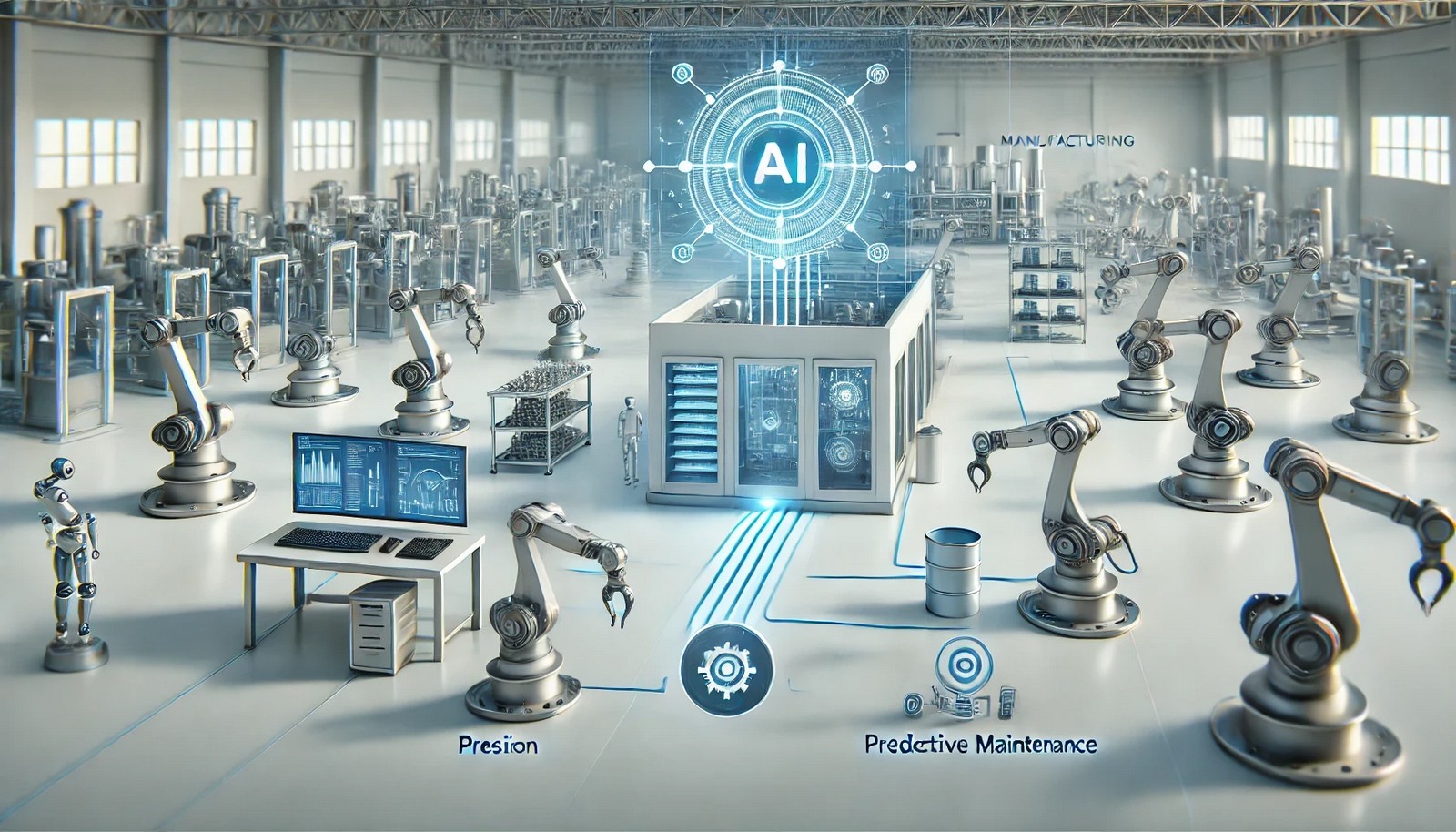AI in Manufacturing

Quick Navigation:
- AI in Manufacturing Definition
- AI in Manufacturing Explained Easy
- AI in Manufacturing Origin
- AI in Manufacturing Etymology
- AI in Manufacturing Usage Trends
- AI in Manufacturing Usage
- AI in Manufacturing Examples in Context
- AI in Manufacturing FAQ
- AI in Manufacturing Related Words
AI in Manufacturing Definition
AI in Manufacturing refers to the application of artificial intelligence technologies in industrial processes to optimize production, improve quality, reduce downtime, and enhance operational efficiency. It includes advanced algorithms, machine learning, and robotics to enable smart automation, predictive maintenance, and adaptive manufacturing systems. By analyzing data from various sources, AI identifies patterns and improves decision-making, making it a core component of the Industry 4.0 revolution.
AI in Manufacturing Explained Easy
Imagine if machines could learn like people do! In a factory, robots and machines with "AI brains" help make things faster and smarter. They learn from the data they see, like watching a video to understand how to make something just right every time. This way, factories can make more cool stuff without wasting materials.
AI in Manufacturing Origin
The use of AI in manufacturing emerged with the growth of automation and data collection in the 20th century. As factories became more advanced, the need to analyze large amounts of production data led to the integration of AI. With Industry 4.0, AI applications have expanded, driving intelligent automation and autonomous systems in manufacturing.
AI in Manufacturing Etymology
The term “AI in Manufacturing” originates from the integration of "artificial intelligence" with "manufacturing," emphasizing the enhancement of production processes through intelligent technologies.
AI in Manufacturing Usage Trends
AI in Manufacturing has surged, especially with the rise of Industry 4.0. Companies now leverage AI to increase productivity, reduce waste, and streamline processes. Fields like automotive, electronics, and pharmaceuticals utilize AI for automated quality control, predictive maintenance, and smart logistics. This trend is growing as AI solutions become more accessible and effective.
AI in Manufacturing Usage
- Formal/Technical Tagging:
- Industrial Automation
- Predictive Analytics
- Machine Learning
- Robotics
- Smart Manufacturing - Typical Collocations:
- "AI-driven manufacturing"
- "smart factory AI"
- "predictive maintenance AI"
- "AI-based quality control"
AI in Manufacturing Examples in Context
- AI-driven systems in car factories can spot defects on assembly lines by analyzing images of each product.
- In electronics manufacturing, AI predicts when equipment will need repairs, preventing costly downtime.
- Pharmaceutical companies use AI to monitor production and ensure consistent quality in every batch.
AI in Manufacturing FAQ
- What is AI in Manufacturing?
AI in Manufacturing is the use of artificial intelligence to enhance production processes. - How does AI improve manufacturing efficiency?
AI optimizes production by predicting issues, reducing waste, and improving decision-making. - What are the main applications of AI in manufacturing?
Applications include predictive maintenance, quality control, and process automation. - How does AI help with predictive maintenance?
AI analyzes equipment data to predict when maintenance is needed, reducing downtime. - Can AI improve product quality in manufacturing?
Yes, AI identifies defects and ensures products meet quality standards. - What is a "smart factory" in AI manufacturing?
A smart factory uses AI and IoT for autonomous, data-driven production processes. - How does AI manage energy use in manufacturing?
AI monitors and optimizes energy consumption, making manufacturing more sustainable. - Is AI in Manufacturing part of Industry 4.0?
Yes, AI is a core technology in the Industry 4.0 movement. - What industries benefit most from AI in Manufacturing?
Automotive, electronics, and pharmaceuticals are leaders in AI manufacturing. - Are there any risks of using AI in Manufacturing?
Risks include data privacy, job displacement, and high implementation costs.
AI in Manufacturing Related Words
- Categories/Topics:
- Industry 4.0
- Robotics
- Machine Learning
- Industrial Automation
- Smart Factories
Did you know?
In 2021, a major car manufacturer saved millions by implementing AI-based quality checks that detect tiny imperfections on vehicles, reducing waste and enhancing product reliability.
PicDictionary.com is an online dictionary in pictures. If you have questions or suggestions, please reach out to us on WhatsApp or Twitter.Authors | Arjun Vishnu | @ArjunAndVishnu

I am Vishnu. I like AI, Linux, Single Board Computers, and Cloud Computing. I create the web & video content, and I also write for popular websites.
My younger brother, Arjun handles image & video editing. Together, we run a YouTube Channel that's focused on reviewing gadgets and explaining technology.



Comments powered by CComment